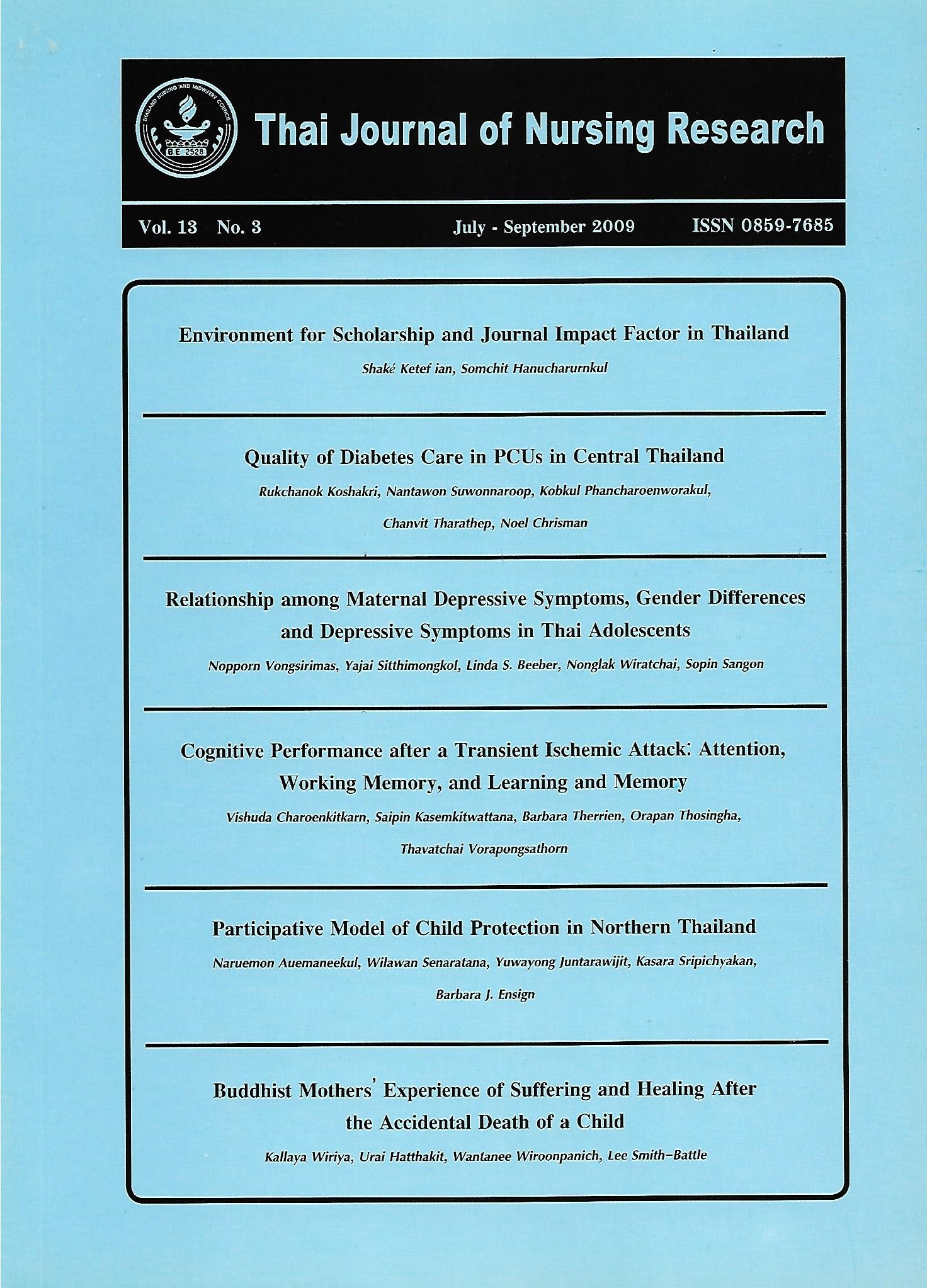Relationship among Maternal Depressive Symptoms, Gender Differences and Depressive Symptoms in Thai Adolescents
Keywords:
ภาวะซึมเศร้าในวัยรุ่น, การสนับสนุนทางสังคม, ความรู้สึกมีคุณค่าในตนเอง, adolescent depressive symptoms, social support, self-esteemAbstract
บทคัดย่อ
งานวิจัยนี้มีวัตถุประสงค์เพื่อทดสอบรูปแบบความสัมพันธ์ของกลุ่มตัวแปรที่มีความสัมพันธ์กับภาวะซึมเศร้าในวัยรุ่นที่มีมารดาซึมเศร้า โดยทำการทดสอบโมเดลสมการโครงสร้างของภาวะซึมเศร้าในวัยรุ่น กรอบทฤษฎีที่ใช้ในงานวิจัยนี้คือ Interpersonal Theory of Depression กลุ่มตัวอย่างได้มาโดยการสุ่มได้วัยรุ่นจำนวน 460 คนและมารดาของวัยรุ่นแต่ละคน เครื่องมือที่ใช้ในการวิจัยที่วัยรุ่นเป็นผู้ตอบ ได้แก่ แบบสอบถามข้อมูลส่วนบุคคล ภาวะซึมเศร้า การเห็นคุณค่าในตนเอง การสนับสนุนทางสังคมจากบุคคลอื่น การสนับสนุนทางสังคมจากมารดา เหตุการณ์ที่สร้างความยุ่งยากใจ และ การเลี้ยงดูของมารดา ส่วนเครื่องมือวิจัยที่มารดาเป็นผู้ตอบ ได้แก่ แบบสอบถามข้อมูลส่วนบุคคลและภาวะซึมเศร้า ผลการศึกษาพบว่า โมเดลสมการโครงสร้างมีความสอดคล้องกับข้อมูลเชิงประจักษ์ และสามารถอธิบายความแปรปรวนของภาวะซึมเศร้าในวัยรุ่นไทยที่มีมารดาซึมเศร้าได้มากกว่า 60 %
ผลการวิจัยนี้แสดงให้เห็นถึงอิทธิพลของภาวะซึมเศร้าในมารดาและบทบาทของตัวแปรส่งผ่านที่มีอิทธิพลต่อการเกิดภาวะซึมเศร้าในวัยรุ่น ผลการศึกษาครั้งนี้ทำให้เกิดความเข้าใจในการพัฒนาโปรแกรมการป้องกันการเกิดภาวะซึมเศร้าในวัยรุ่นที่มีมารดาซึมเศร้าและการส่งเสริมภาวะสุขภาพจิตในเด็กไทยที่มีมารดามีภาวะซึมเศร้า
คำสำคัญ: ภาวะซึมเศร้าในวัยรุ่น การสนับสนุนทางสังคม ความรู้สึกมีคุณค่าในตนเอง
Abstract
To examine the pattern of relationships among factors related to depressive symptoms in adolescents of mothers with depressive symptoms, the structural equation model of adolescent depressive symptoms was tested. The conceptual framework, for this study, drew on the Interpersonal Theory of Depression. Through use of stratified sampling, 460 Thai adolescents, and respective mother, were selected for participation. All adolescents completed the: Demographic Data Questionnaire; Center for Epidemiologic Studies Depression Scale; Rosenberg’s Self-esteem Scale; Multidimensional Scale of Perceived Social Support; Maternal Supportive Behaviors Questionnaire; Negative Event Scale; and, Parental Bonding Instrument. Each mother completed the: Demographic Data Questionnaire; and, Center for Epidemiologic Studies Depression Scale. Data were analyzed using LISREL. A goodness of fit was obtained with the model. The adolescents’ depressive symptoms accounted for over 60% of the variance.
A strong effect of maternal depressive symptoms on depressive symptoms among Thai adolescents, as well as on mediation by intervening variables, was found. The results also enhanced understanding of how to develop and target nursing interventions to prevent development of depressive symptoms, and optimize mental health, among Thai adolescents, when their mother suffers from depressive symptoms.
Key words: adolescent depressive symptoms, social support, self-esteem
Downloads
How to Cite
Issue
Section
License
Copyright: The Pacific Rim International Journal of Nursing Research, Thailand Nursing & Midwifery Council has exclusive rights to publish, reproduce and distribute the manuscript and all contents therein.








.png)



